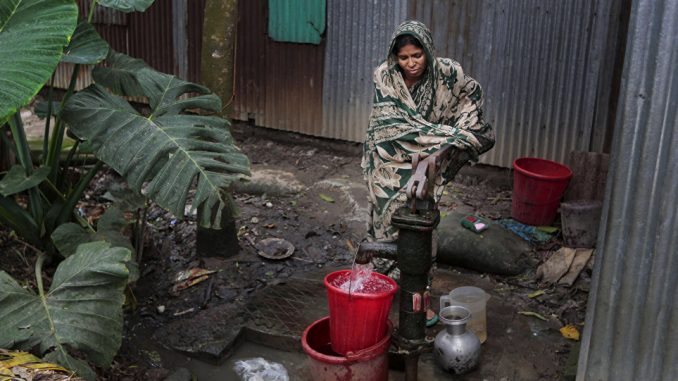
Poisonous water is causing a major health crisis in rural Bangladesh.
Around 20 million people are suffering from what is being called the largest mass poisoning in history as they continue to drink arsenic-laced water, twenty years after the deadly toxin was discovered in the supply

BYPASS THE CENSORS
Sign up to get unfiltered news delivered straight to your inbox.
You can unsubscribe any time. By subscribing you agree to our Terms of Use
Latest Video
According to human rights watch the local governments have allowed the issue to be pushed to the back-burner, with nepotism and poor governance contributing to the current state of the water in Bangladesh.
The Guardian reports:
Latest estimates suggest 43,000 people in Bangladesh die each year from arsenic-related diseases. These include skin lesions, cancers, and cardiovascular and lung illnesses.
According to the government, 5 million village wells were tested between 2000-03, with pumps painted red or green according to whether they were safe or unsafe. In 2003, an estimated 20 million people drank arsenic-laced water.
But, says the report, all urgency to address the problem has disappeared and the rate of contamination is now much the same as it was in 2003. Recent studies have found 20 million people are still exposed to unsafe levels of arsenic contamination.
According to HRW, some politicians are awarding safe wells to their supporters and allies instead of giving them to the people in rural areas who most need them, and there is little testing or monitoring of vulnerable communities.
“The official response to arsenic contamination … is failing, with the government expending considerable resources in areas where the risk of arsenic contamination is relatively low and where water coverage is relatively good,” says the report.
“Bangladesh isn’t taking basic, obvious steps to get arsenic out of the drinking water of millions of its rural poor. The government acts as though the problem has been mostly solved, but unless the government and Bangladesh’s international donors do more, millions of Bangladeshis will die from preventable arsenic-related diseases,” said HRW researcher Richard Pearshouse.
Chronic exposure to arsenic is linked to cancers of the liver, kidney, bladder and skin as well as heart disease. The arsenic crisis in Bangladesh is “the largest mass poisoning of a population in history” according go the UN’s World health Organisation, who also warn that the government and international donors need act against the water contamination.


